


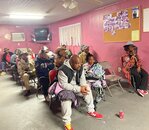
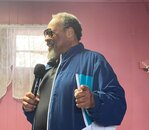
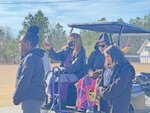
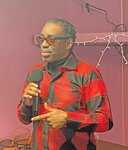
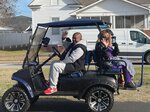
Dr. Martin Luther King Jr. was born on January 15, 1929 in Atlanta, Georgia. Each year on the third Monday in January, Dr. King’s life, legacy, and lessons are remembered and honored.
In Williston, an annual walk is held along the rail trail followed by a ceremony at the Williston Community Service Club on Joseph Street. Traffic was controlled by the Williston Police Department.
Around 20 participants prayed and sang at the few stopping points along the walk, with a prayer speaking to Dr. King’s message of non-violence given by Reverend Vivian Ashley.
“We want to thank God for the man Martin Luther King,” said Rev. Ashley, who also thanked all those who stood alongside Dr. King during the Civil Rights Movement.
Following the walk was a ceremony led by event organizer Ronnie Brown. Brown explained this year’s ceremony had been reinvigorated to provide inspiration two weeks into the New Year.
Brown thanked the pioneers of the Williston Community Service Club calling them “originators to help the dream continue on.”
The first walk was held in the early 1960s and only had five in attendance, according to Brown: himself, Frank Brown, Al Brown, Vanessa Strong, and Anne Strong. It began at the Springbranch Church on Main Street.
Attendance at the walk has fluctuated over the past couple of decades, some years 12 would participate and some years hundreds would come out. This year, those in attendance were seemingly glued to their chairs as historian Wayne O’Bryant shared a bit about Dr. King and the Civil Rights Movement.
O’Bryant is an award-winning author, historian, lecturer, and researcher born in Charleston in 1960 – six years into the Civil Rights Movement.
O’Bryant was raised by three generations of educators who imparted their knowledge onto him. He grew up attending marches and demonstrations while still toddling. His great-grandmother was born in 1895 to emancipated slaves. She began teaching in 1914, and soon understood what was taught in schools was not the whole story.
O’Bryant’s great-grandmother taught him how to fill in the holes of history – the parts not taught by history books but through generational retellings. He absorbed her knowledge since he was a toddler and carried it with him throughout his life, not knowing at first how he would be called upon to share those very oral histories after she died.
“I realized she wasn't telling me for me to keep, she was telling me to spread it,” said O’Bryant.
“I was getting 200 years of oral history,” he said. His great-grandmother was telling him the history her parents taught her, and what their parents taught them.
The parts of history that get excluded from textbooks are commonly the accomplishments and struggles of marginalized communities. When O’Bryant was growing up, his great-grandmother ensured he knew the story of changemakers and leaders like Claudette Colvin who were often left out of the text but played an integral role in breaking down the walls of segregation.
When Colvin was only 15 in 1955, she refused to give up her seat to a white woman on an Alabama bus. She was arrested and charged. At the time, Rosa Parks served as the NAACP’s secretary and mentor to Colvin through the organization’s Youth Council.
Civil rights organizers were looking to garner support and gain more youth involvement in the movement. When Colvin went to trial, segregation related charges were dropped and organizers sought an adult to face the movement. Parks’ enthusiasm, maturity, and knowledge made her an ideal candidate and Colvin’s refusal to move her seat was replicated with Parks.
Colvin and Parks were not the only women to challenge segregation laws in the Alabama bus system - many Black women refused to give up their seats on the very same buses in the 1950s.
O’Bryant also shared some insight into two of Dr. King’s most renowned speeches despite never seeking out a path of civil rights advocacy.
“King never thought about going into civil rights,” said O’Bryant. “Martin Luther King Jr. was born to be what he was.”
O’Bryant explained God guides people where they are needed– similarly to how he knew he was meant to share the knowledge of his ancestors before him.
His wife, Rana, said that her husband is “doing what God called him to do.”
Dr. King’s words of nonviolence still ring true after being spoken nearly 60 years ago.
For more information on the life and legacy of Dr. Martin Luther King Jr., visit https://thekingcenter.org/.